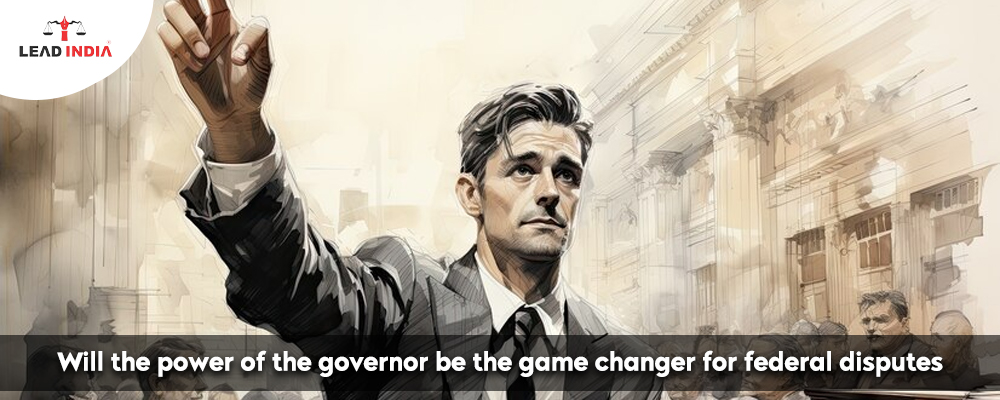Governors are the top executive authorities in India’s twenty-eight states, and the president appoints them all. The governor will have executive, legislative, budgetary, and judicial powers and responsibilities.
Need A Legal Advice
The internet is not a lawyer and neither are you. Talk to a real lawyer about your legal issue

Powers and functions of the governor
- Executive powers – It refers to the governor’s powers and functions as carried out by the council of ministers in his or her name. As a result, the Governor serves as a ceremonial head, while the board of ministers is the genuine executive. The Governor appoints the following positions to serve throughout his tenure, at the request of the Chief Minister: Advocate General, Chief Minister of the State, and other state ministries. He can recommend to the President that a state of constitutional emergency be declared. During the President’s reign in a state, the governor exercises extensive administrative powers and serves as the President’s agent.
- Legislative powers- When a Governor is presented with a bill (other than a money bill) for his approval, he either gives his approval, withholds his consent, or returns the bill to the Houses for reconsideration. If the law is reenacted by the state legislature, with or without revisions, he must either provide his consent or reserve the statement for President and Cabinet consideration. In terms of the legislature, he has the power to summon, prorogue, and dissolve the legislative assembly if it loses confidence.
- Financial authority – Only his proposal may be present in the state legislature once he files an annual financial report with the legislature. No grant requests may be made unless he recommends them. The contingency reserve can be use to meet unforeseen expenses. Every five years, he appoints a finance team to review the financial status of municipalities and panchayats.
- Judicial powers – When selecting judges for the State High Court, the President meets with the state’s governor.
Supreme Court judgment on Governor Powers will be a game changer for federal disputes
The Governor’s office has begun to take a disproportionate role in the affairs of opposition-ruled states, particularly since the Narendra Modi government was electe for a second term in 2019. Most opposition-ruled states, including Kerala, West Bengal, Punjab, Telangana, Jharkhand, Tamil Nadu, and New Delhi have had conflicts with their governors, who have used their discretionary powers under the Constitution to demonstrate domineering attitudes towards elected governments. Some of these administrations have recently begun to approach the judiciary, seeking judicial remedies to maintain smooth governance in their states and to keep the Governors in check.
The Supreme Court’s decision in State of Punjab versus Principal Secretary to the Governor of Punjab and Another, pronounced on November 10 and made available on November 23, is a watershed moment in resolving federal conflicts involving the Governor’s office. The elect administration of Punjab was upset because its Governor, Banwarilal Purohit, refuse to sign or return four bills pass by the State Assembly. The Governor was also accuse of failing to submit a recommendation for the introduction of certain Money Bills in the Assembly.
In its decision, the Supreme Court’s three-judge bench led by the Chief Justice of India, D.Y. Chandrachud, and comprising Justices J.B. Pardiwala and Justice Manoj Misra, held that in a Parliamentary form of democracy, real power rests with the elected representatives of the people and that the Governor, as the President’s appointee, is the titular head of State. The bench clarified that the Governor operates with the “aid and advice” of the Council of Ministers, except in areas where the Constitution grants the Governor discretionary power.
The bench made it clear that the Governor could not withdraw assent to a Bill unless he followed the procedure outlined in the first proviso of Article 200, which was to communicate to the State Legislature “as soon as possible” a message warranting the Bill’s reconsideration. The phrase “as soon as possible” communicates a constitutional mandate of expediency, according to the bench. “Failure to take a call and keep a lawfully enacted bill for indefinite lengths of time is an action that contradicts that expression.
The judgment explicitly chastised the Punjab Governor for his actions in raising doubt on the legitimacy of the Assembly session, stating that it was fraught with dangers to democracy.Lead India Law provides free legal advice and online information among other legal services. We offer a platform where you can talk to a lawyer and ask legal questions. Lead India’s lawyers can help you with any legal matters. Lead India offers free online legal help in India. In addition to providing legal advice online, Lead India allows users to ask professionals questions for free.





 Talk to a Lawyer
Talk to a Lawyer